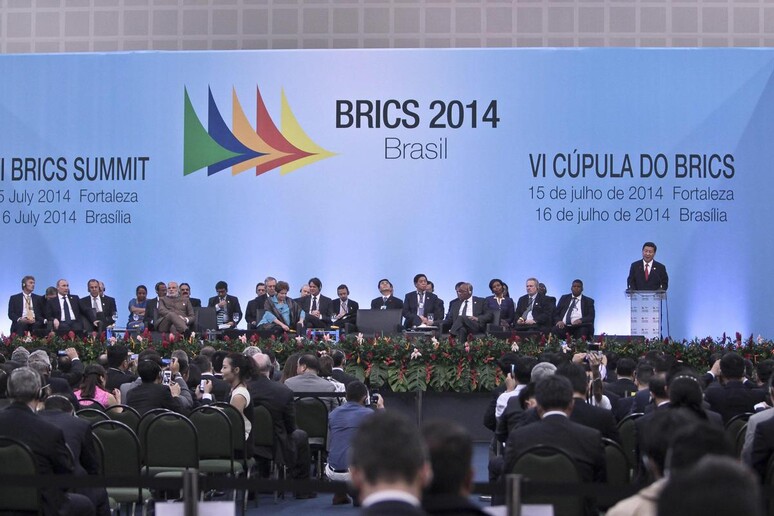(People's Daily Online) - Beijing, July 17 - Leaders of
Brazil, Russia, India, China and South Africa inked a deal on
Tuesday to launch a development bank with an initial $50 billion
capital and a $100 billion monetary reserve.
According to the accompanying declaration, the bank and the fund
aim "to mobilize resources for infrastructure and sustainable
development projects in BRICS and other emerging and developing
economies", and are intended to serve as an alternative to the
Western-dominated World Bank and International Monetary Fund
(IMF) The five countries decided that the New Development Bank
(NDB) would be headquartered in Shanghai and its initial
subscribed capital will be equally shared among founding
members, according to the Fortaleza Declaration.
The first chair of the Board of Governors will be from Russia,
the first chair of the Board of Directors from Brazil, and the
first president of the bank from India.
The establishment of the BRICS Development Bank and the
contingency reserve arrangement (CRA) help promote a
multilateral financial diplomacy advocated by China.
Lin Yueqin, director of China Social Science magazine, told
People's Daily Online that in recent years, China's diplomacy
has come under a lot of pressure. With the help of the
multilateral mechanism and platform, China will have more say in
the world, he said.
Lin said that in response to international financial turmoil,
the NDB will use the RMB for trade and investment in BRICS. It
will certainly help to promote the internationalization of the
RMB.
In the long term, the NDB will help to rebuild the international
financial order and break the major powers' monopoly of the
international financial system. The mechanism of joint
development will be open to more developing economies, and form
an emerging force.
In terms of economic function, the NDB will provide long-term
development aid to developing countries. The monetary reserve
will provide an economic stability fund to help BRICS countries
respond to financial emergencies, associate professor Li Wei of
Renmin University said in an interview with People's Daily
Online.
Li said that the BRICS Development Bank and the CRA will help
emerging nations to borrow cash for building highways, power
stations and other major infrastructure projects, and to better
cope with the risks created by international capital flows and
the impact of financial turmoil.
Since the end of World War II, under the Bretton Woods financial
system created by its victors, the World Bank and the
International Monetary Fund have had a near monopoly on
development and emergency financing.
"Developing countries have begun to self-organize and set up
their own programs in response to the current international
economic order." Zhang Haibing, researcher of Shanghai
International Study Institute believes that the NDB is an
effective complement to the existing international multilateral
development cooperation mechanisms.
Zhang said that its impact on the developing world could be
enormous - freeing it from the Western-dominated financial
institutions and stimulating accelerated growth in emerging
markets.
Speaking at a press conference during his visit to Beijing on
July 8, World Bank President Jim Yong Kim regarded the NDB as a
new force for battling poverty and sharing prosperity globally.
"The need for new investment in infrastructure is massive. We
think we can work very well in cooperation with the new banks
once they become a reality." According to Kim, the establishment
of the NDB, catering to the need for infrastructure investment
in developing countries, is welcomed by the World Bank.
The World Bank provided 60 billion US dollars last year. When
combined with investment from private sectors, the total added
up to around 150 billion US dollars, far short of real demand.
ALL RIGHTS RESERVED © Copyright ANSA











